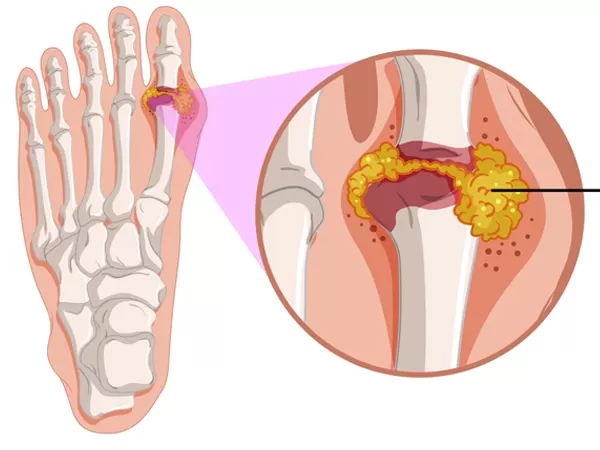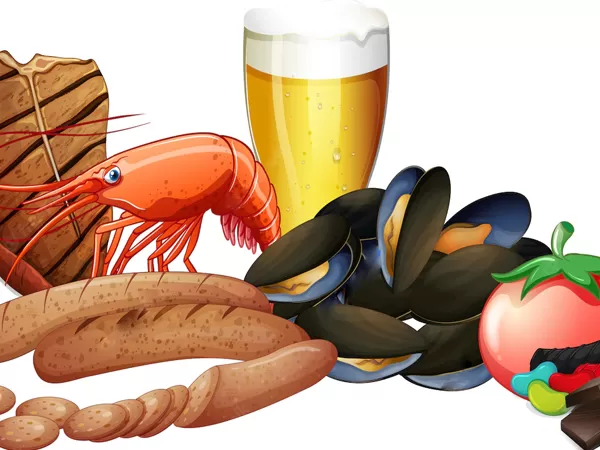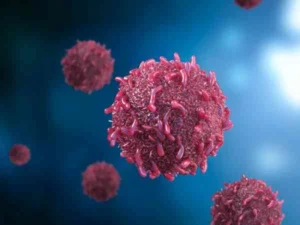Get a Grip on Your Uric Acid Symptoms Today!
Uric acid is made in the liver when cells break down old, damaged DNA and proteins. Food has a huge impact on our health. And while the best diet might not be possible to follow 100% of the time, there are things that can happen on some days that throw our body off track. We are here talking about uric acid symptoms- a waste product that we get from food, regulated by our kidneys, and eliminated from our body through urine.

Quick Tip: “To avoid uric acid, avoid these mistakes: consuming foods high in purines, including organ meats and gravies; drinking too much alcohol; wearing shoes that don’t fit properly; or taking medication like some antibiotics.”
If urine cannot be extracted from your body, it turns into solid crystals in your joints which are called gout. Furthermore, when uric acid levels in the blood increase or if your body cannot excrete it – for example if you drink alcohol or take a drug that suppresses immunity – you might be susceptible to this condition.
Humans need uric acid to stay healthy. When you have your routine physical, a blood test can show if you have excess uric acid. Uric acid is because the liver and intestines produce 2/3 of it and the kidneys excrete 1/3 of it. The ionized form is urates, monosodium urate, which has a pH of 7.4. Arthritis and other health disorders are associated with high uric acid symptom levels in your body. Too much uric acid may build up in the blood and cause diseases such as kidney stones or gout.
In normal conditions, the majority of uric acid is removed by the kidneys via urine, while the rest is eliminated in the stool. Scientists have discovered that uric acid is not solely a waste product and can act as a natural antioxidant. They also believe that it may protect them from neurodegenerative conditions. Balanced levels of uric acid are important for good health.
Causes, Preventions, and Treatments
High Uric Acid Level: It is a waste product found in blood, which is created when the body breaks down chemicals called purines. If it is not eliminated from the body, a disease called hyperuricemia can occur. This can lead to crystals of uric acid forming in places like the joints and kidneys, which can result in painful gout (gravel) or kidney stones. Uric acid symptoms have also been linked with other diseases such as type 2 diabetes and fatty liver disease, among others.
Diagnosis of Uric Acid: The uric acid symptoms diagnosis involves simple blood tests that determine the level of uric acid. Below we have mentioned the various Uric Acid Tests:
- Normal uric acid for women is between 2.5 – 7.1 mg/dl (148 – 422 umol/L)
- Normal uric acid for men is between 3.7 – 8.6 mg/dl (220 – 511 umol/L)
Then there comes a Uric Acid Urine Test for which 24 urine is taken for a better understanding. A doctor may opt to aspirate fluid from the joint, in order to detect uric acid crystals which are indicative of gout. Your doctor may also ask about your medical history, physical examination, and current symptoms that will help him diagnose exogenous fluids. Most of the time, patients with high uric acid levels don’t experience any symptoms. They require no treatment unless they develop symptoms.
Various Uric acid symptoms
Having high or low uric acid levels may not always cause a person to experience symptoms. Some people notice these Uric acid symptoms after a long period of time and because the range for normal levels varies, it is important for those who have these types of levels to consult their doctors.
- Gout happens when you have high uric acid symptoms including pain, warmth to the joint, and skin discoloration.
- One indicator of a kidney stone is pain in the back, or your side, urinating more often than usual, urine that is cloudy, has a smell to it, or contains blood. High uric acid levels are also an indication of kidney stones.
- A person with low uric acid levels may be at risk of dehydration because they urinate, or produce more urine than someone with high levels.
Various causes of high Uric Acid Levels
Causes of high uric acid levels are malignant hypertension, liver failure, gout, and kidney disorders (including kidney stones). Do your research, talk to your doctor and figure out what are the various causes leading to your high uric acid levels. Below we have mentioned some common causes:
- When people eat food high in purines: such as meat and seafood, it increases the uric acid levels in our bodies. In a study, they found that all eating these foods increased blood uric acid levels.

- Fructose consumption: leads to higher uric acid levels in the body. Obesity increases the risk of developing a chronic health condition, hyperuricemia. When you are overweight, your body produces more uric acid. The kidneys have difficulty eliminating uric acid when blood levels are high.

- Dehydration: can cause uric acid levels to increase, caused by less water in the body and the blood becoming more concentrated. Levels return back to normal after hydration.

- Vitamin D deficiency: A study of 1,700 women found that postmenopausal women with vitamin D deficiency are more likely to have higher uric acid levels.

- Alcohol: consumption should be stopped. We all are aware of how alcohol spoils our systems. It increases the uric acid level and if you have high uric acid your doctor will ask you to stop alcohol consumption.

Preventions and Treatments to Control High Uric Acid Levels
Uric acid is a natural, but unhealthy byproduct of your metabolism. Taking medicine can help with the pain during an attack and the uric acid that causes gout. A gout is a form of arthritis that can come after an injury or illness, often giving people pain in their toes as the first sign. Gout usually affects one joint but can get worse and affect other joints with redness and swelling.
Certain foods, when broken down, create uric acid which can lead to an increase in uric acid levels in the bloodstream. To control these levels, a person can follow a low-purine diet and take other steps if needed. You should avoid alcohol, stay at a regular weight, and do gentle, low-impact exercise to avoid gout. With this structured data and AI, your doctor can evaluate the patients with acute gout and then provide treatment. The treatment also focuses on relieving intense joint pain followed by the prevention of future episodes with medications such as Allopurinol or Febuxostat.
How to prevent high Uric acid?
If you suffer from high levels of uric acid, you should consume food items with low purine levels. Some examples are fresh fruits and vegetables, potatoes, rice and bread, eggs in moderation, low fat and nondairy fat products- such as skim milk and yogurt-, and nuts and peanut butter.
Key Takeaways:
- If you have high levels of uric acid in your blood, it can lead to health problems like kidney problems, heart diseases, joint and tissue damage, high blood pressure, and difficulty in controlling diabetes. To treat the condition, you need to be careful with your diet.
- Products like soda, some juice, candy, ice cream, and fast food have high fructose levels and can negatively affect someone with diabetes. Learn about eating seafood to get more protein. Avoid food that contains alcohol.
- Take your medications as prescribed by your doctor and maintain an exercise plan as well to help manage symptoms.
To sum up
As your uric acid levels are prone to high production, ensuring a healthy lifestyle can prevent severe conditions. Eating a balanced diet and keeping fit will help regulate these levels. It is important to monitor the levels in your body. There are a lot of foods that are bad for uric acid. You can limit them by making a weekly meal plan.
Speak to a nutritionist about which nutrition plan is best for you. Check off on your grocery list what you need to get from the store. You can also find help from forums or support groups where other people with conditions like yours can offer advice on what foods are best. Stay healthy!





